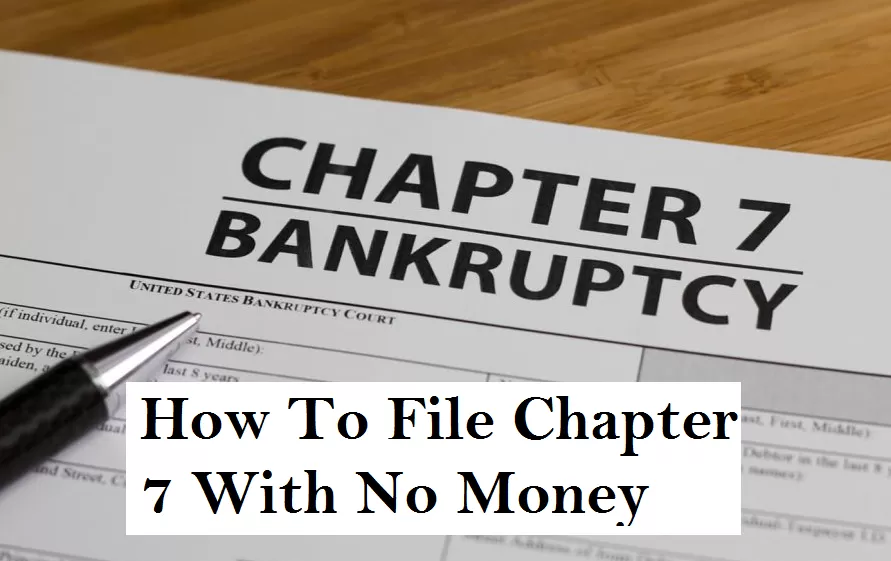How To File Chapter 7 With No Money
Filing for Chapter 7 bankruptcy is one of the most common ways to eliminate your debts and make a fresh financial start. This type of bankruptcy allows you to wipe out most, if not all, of your unsecured debt, such as credit card bills and medical bills. However, there are certain eligibility requirements that you must meet before filing for Chapter 7.
If you have no money and want to file for Chapter 7 bankruptcy, it’s important to understand that there will be some costs involved in the process. For example, there is a filing fee that you’ll need to pay when submitting your petition. You may be eligible for a waiver or instalment plan if you cannot afford this fee. You may also need to pay for credit counselling and debtor education courses.
In addition to the costs associated with filing for bankruptcy, some consequences come with it. Filing for Chapter 7 will negatively impact your credit score and can stay on your credit report for up to ten years. It’s important to weigh these factors against the potential benefits before deciding whether or not filing for Chapter 7 is right for you.
How to file Chapter 7 on your own
Filing for Chapter 7 bankruptcy can be daunting, especially when you have no money. However, it is possible to file independently without hiring an attorney. First, gather all necessary paperwork, such as tax returns, pay stubs, and bills. You will also need to complete a credit counselling course before filing.
Next, complete the necessary forms online or at your local bankruptcy court. Ensure you complete everything correctly and truthfully to avoid any legal consequences. Once you have completed the paperwork, file it with the court and meet with your creditors.
While filing for Chapter 7 on your own may seem like a cost-effective solution, it is important to note that there are risks involved, such as making mistakes on your paperwork that could lead to denial of discharge or even criminal charges. It is always recommended to seek professional advice before proceeding with legal actions.
How to qualify for Chapter 7 bankruptcy
If you are struggling financially and considering filing for Chapter 7 bankruptcy, you must meet a few requirements to qualify. Firstly, your income must be below the median income level for your state of residence. If it is above this level, you may still be eligible if you can pass the means test, which considers your disposable income and expenses.
Next, you must complete a credit counselling course from an approved provider within 180 days before filing for bankruptcy. Additionally, it is important to note that certain debts, such as taxes and student loans, may not be discharged through Chapter 7 bankruptcy.
If you are worried about bankruptcy filing costs, options may be available to help cover these expenses. For example, some legal aid organizations offer assistance with filing for Chapter 7 at little or no cost to those who qualify based on their income level.
What are the steps to filing for Chapter 7 bankruptcy?
Filing for Chapter 7 bankruptcy can be a daunting task. However, it is still possible to file independently if you have no money to hire an attorney or pay the court fees. The first step is to gather all your financial information, including income, expenses, debts and assets. You can do this by using online resources or visiting a local library.
Next, complete the necessary bankruptcy forms, including the petition, schedules and statement of financial affairs. These documents will detail your financial situation and help determine if you qualify for Chapter 7 bankruptcy. Once completed, file these forms with the bankruptcy court in your area.
After filing the paperwork with the court, you will need to attend a meeting of creditors where you will be asked questions about your finances under oath. This hearing is typically held within 30-40 days after filing and is required for all filers regardless of whether they use an attorney. Finally, once all requirements are met, and any necessary payments are made (if applicable), your debts will be discharged through Chapter 7 bankruptcy, allowing you to start fresh financially.
Can I file for Chapter 7 bankruptcy if I have no money?
Filing for Chapter 7 bankruptcy can be daunting, especially if you have no money. However, it is still possible to file for bankruptcy without any funds. First and foremost, it’s important to understand that filing fees must be paid before your case is filed. If you can’t afford the fee, you may ask the court to waive or reduce the fee.
In addition to filing fees, other costs are associated with filing for Chapter 7 bankruptcy, such as attorney fees and credit counselling fees. If you cannot afford an attorney, consider contacting legal aid services in your area or looking into pro bono attorneys who may offer their services free of charge.
Remember that filing for Chapter 7 bankruptcy requires careful consideration and planning. Gather all necessary documents and information before beginning the process to ensure a smooth and successful outcome.
FAQs
Can I file for Chapter 7 bankruptcy with no money?
Yes, filing for Chapter 7 bankruptcy with no money is possible. The filing fee for Chapter 7 is $335, which can be waived if you meet certain income qualifications. Additionally, you can work with a pro bono attorney or legal aid organization that provides free or reduced-cost services.
What documents do I need to file for Chapter 7 bankruptcy?
To file for Chapter 7 bankruptcy, you must provide several documents, including your most recent tax returns, pay stubs or proof of income, bank statements and a list of all your creditors and debts. It’s important to note that these requirements may vary by state and jurisdiction.
Will filing for Chapter 7 bankruptcy affect my credit score?
Yes, filing for Chapter 7 bankruptcy can harm your credit score. However, suppose you are struggling with overwhelming debt and missed payments already exist on your credit report. In that case, the benefits of discharging your debts through bankruptcy may outweigh the short-term hit to your credit score. With responsible financial management post-bankruptcy filing, it is possible to rebuild your credit over time.










